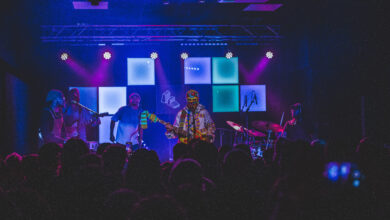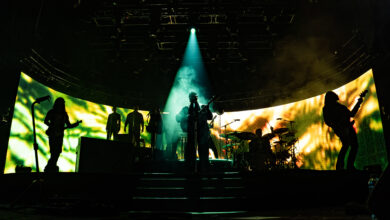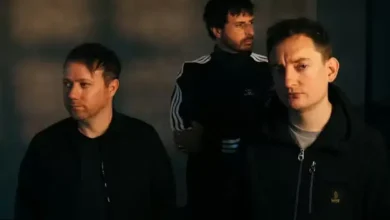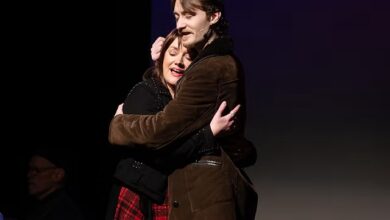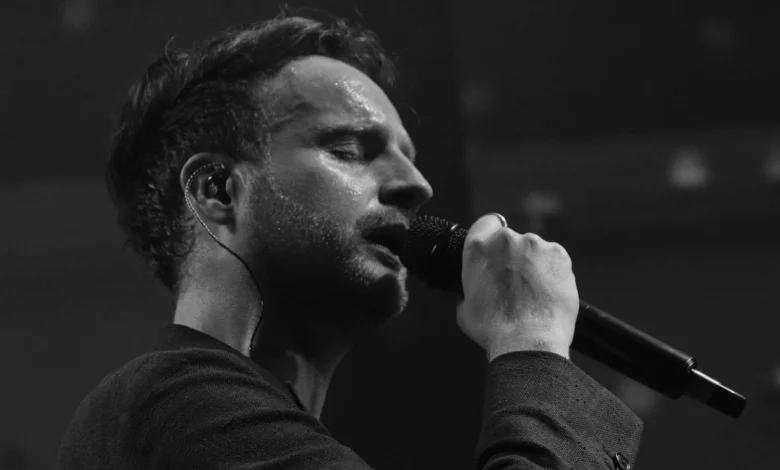
Being an actor, Andrew Gower has no problems sticking to the script. He’s played Bonnie Prince Charles in Outlander and a vampire solicitor in BBC3’s Being Human, as well as appearing in Black Mirror and You. But when it comes to music, the opposite is true: he’s searching for spontaneity, instinct and whatever the moment might bring.
With new single Dance to the Algorithm, his band Gustaffson explore the perils of modern music consumption, something which has changed radically since he and best friend James Webster first formed the band back in 2012. Though they kept a low profile for several years, a chance meeting with Craig Potter led to Elbow producing their debut Black & White Movie. Now with the addition of David Gleave (bass), Liam Morson (keys), and Graham Bennett (drums), Gustaffson have evolved from a side project to a band with a mission.
Their songs have a rootsy, blues-inspired sound bolstered by Gower’s soulful falsetto, as well as a production style which recalls the bright retro palette of Mark Ronson. The desire to create authentic-sounding music is a point of pride for the band, who have been known to happily squeeze eighty-piece choirs into the studio, always opting for human unpredictability over studio trickery.
They’ve also filmed music videos in beloved theatres like the Liverpool Empire, paying their dues to the city’s musical history by playing the same stage as legends such as the Beatles and Chuck Berry. “I think the fact Liverpool is a port and we had new music arriving on our doorstep from the US (before everyone else) definitely influences our work,” says Gower. “Ports make for the best storytellers. Music travels and I think cities built around ports have proven that philosophy.”
Gustaffson – Dance To The Algorithm (Official Music Video)
There’s definitely a strong Liverpool thread running through their work. Gower has written tributes to Goodison Park, featured Sue Johnston in a video, and even produced and starred in a film exploring the dashed hopes of Merseybeat hopeful Tommy Quickly (who was, in fact, a relative): “His story has always intrigued me. To have been signed to the Epstein management fold and toured the world with The Beatles is unbelievable. Why didn’t it work out for Tommy?” Another song The Jacaranda takes a fond look back at Gower’s youth, connecting the Jac’s history as an early Beatles haunt to the enduring importance of music venues across the city.
Even Manchester gets a look in. Directed by Gower, the music video for Dance to the Algorithm features a fairly lost astronaut undertaking a weird and wonderful Mancunian odyssey, before winding up in the studio with Gustaffson. It reflects the song’s message to seek inspiration from our surroundings, instead of staring at “LA manufactured skies” – to disentangle ourselves from spreadsheets and breathe some real air.
Some of Gower’s concerns date back to lockdown – with lyrics about teachers conducting lessons through a screen, and online dating – but the more immediate question is why we still do this, now that we have the freedom to go out and live our lives to the full.
To understand where Gustaffson are coming from, you only have to look back to that same 1960s scene which has given them so much inspiration; the mutual thrill back when musicians piled deep into dank cellars to play for music fans who had queued round the block for a glimpse. This shared energy is something that risks getting lost, clouded by our habits of viewing the world through a secondary lens.
“The best artists of years gone by have proven you can write about profound and important worldly subjects yet still entertain your audience,” Gower reflects. On that note, he recalls a Beatles documentary screening he attended last year: “Giles Martin was there, and during the Q&A he said ‘nowadays people hear music but don’t listen to it’, which articulated something I haven’t been able to put down in words myself.”
But while Gustaffson might question the flash-in-the-pan popularity of TikTok hits, as well as how passively many of us now absorb music, their message is far from cynical. Dance to the Algorithm invites us to simply get back to enjoying what we hear. “I want to write music that makes people listen, to share it in the traditional sense,” Gower concludes. “I think it’s an exciting challenge that modern day music and art consumption has offered up – and we’re up for that challenge!”
Dance To The Algorithm is out now on all major streaming platforms.
Follow Gustaffson @gustaffsonmusic on Instagram for updates.




